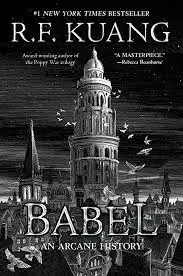Plot (minimal spoilers)
In the 1800, at the hight of the English colonial empire, a Chinese boy called Robin is taken away from his motherland to study translation at Oxford, where translation is the key to the magical silver works. At Oxford, he is confronted with deep-rooted discrimination. There, he finds friendship and, after all, a sense of belonging. But the Empire's greed knows no bounds, and Robin will have to make difficult choices.
Commentary
This book is a masterpiece, a tapestry of words woven with many theme, each complementing and expanding the others. The recurring theme is language, but that’s just the beginning. This book talks about friendship, about happy days, dedication and success, it talks about exploitation, capitalism, colonisation and deep-seated rage. It uses an empathic, charming writing to talk about harsh truths that are hard to confront. As a reader, you get lulled in, starting the story with a fairly standard beginning for a coming of age story with a steam punk setting, but you soon find yourself in a very different literary landscape, a landscape rarely explored with this much talent.

Everything by Le Guin is pure gold! I will add this one to my reading list, but I lived “The Dispossessed “ as political science-fiction, while “the left hand of the darkness” explores gender and prejudices, and “earthsea” is a series of coming of age novels. Every is so good